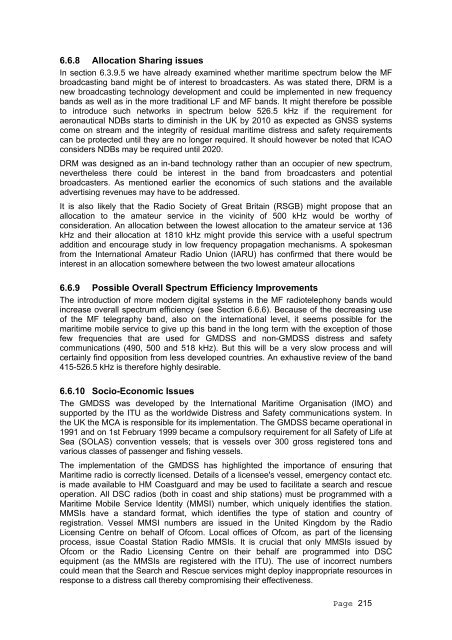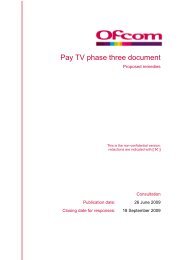FINAL REPORT - Stakeholders - Ofcom
FINAL REPORT - Stakeholders - Ofcom
FINAL REPORT - Stakeholders - Ofcom
You also want an ePaper? Increase the reach of your titles
YUMPU automatically turns print PDFs into web optimized ePapers that Google loves.
6.6.8 Allocation Sharing issues<br />
In section 6.3.9.5 we have already examined whether maritime spectrum below the MF<br />
broadcasting band might be of interest to broadcasters. As was stated there, DRM is a<br />
new broadcasting technology development and could be implemented in new frequency<br />
bands as well as in the more traditional LF and MF bands. It might therefore be possible<br />
to introduce such networks in spectrum below 526.5 kHz if the requirement for<br />
aeronautical NDBs starts to diminish in the UK by 2010 as expected as GNSS systems<br />
come on stream and the integrity of residual maritime distress and safety requirements<br />
can be protected until they are no longer required. It should however be noted that ICAO<br />
considers NDBs may be required until 2020.<br />
DRM was designed as an in-band technology rather than an occupier of new spectrum,<br />
nevertheless there could be interest in the band from broadcasters and potential<br />
broadcasters. As mentioned earlier the economics of such stations and the available<br />
advertising revenues may have to be addressed.<br />
It is also likely that the Radio Society of Great Britain (RSGB) might propose that an<br />
allocation to the amateur service in the vicinity of 500 kHz would be worthy of<br />
consideration. An allocation between the lowest allocation to the amateur service at 136<br />
kHz and their allocation at 1810 kHz might provide this service with a useful spectrum<br />
addition and encourage study in low frequency propagation mechanisms. A spokesman<br />
from the International Amateur Radio Union (IARU) has confirmed that there would be<br />
interest in an allocation somewhere between the two lowest amateur allocations<br />
6.6.9 Possible Overall Spectrum Efficiency Improvements<br />
The introduction of more modern digital systems in the MF radiotelephony bands would<br />
increase overall spectrum efficiency (see Section 6.6.6). Because of the decreasing use<br />
of the MF telegraphy band, also on the international level, it seems possible for the<br />
maritime mobile service to give up this band in the long term with the exception of those<br />
few frequencies that are used for GMDSS and non-GMDSS distress and safety<br />
communications (490, 500 and 518 kHz). But this will be a very slow process and will<br />
certainly find opposition from less developed countries. An exhaustive review of the band<br />
415-526.5 kHz is therefore highly desirable.<br />
6.6.10 Socio-Economic Issues<br />
The GMDSS was developed by the International Maritime Organisation (IMO) and<br />
supported by the ITU as the worldwide Distress and Safety communications system. In<br />
the UK the MCA is responsible for its implementation. The GMDSS became operational in<br />
1991 and on 1st February 1999 became a compulsory requirement for all Safety of Life at<br />
Sea (SOLAS) convention vessels; that is vessels over 300 gross registered tons and<br />
various classes of passenger and fishing vessels.<br />
The implementation of the GMDSS has highlighted the importance of ensuring that<br />
Maritime radio is correctly licensed. Details of a licensee's vessel, emergency contact etc.<br />
is made available to HM Coastguard and may be used to facilitate a search and rescue<br />
operation. All DSC radios (both in coast and ship stations) must be programmed with a<br />
Maritime Mobile Service Identity (MMSI) number, which uniquely identifies the station.<br />
MMSIs have a standard format, which identifies the type of station and country of<br />
registration. Vessel MMSI numbers are issued in the United Kingdom by the Radio<br />
Licensing Centre on behalf of <strong>Ofcom</strong>. Local offices of <strong>Ofcom</strong>, as part of the licensing<br />
process, issue Coastal Station Radio MMSIs. It is crucial that only MMSIs issued by<br />
<strong>Ofcom</strong> or the Radio Licensing Centre on their behalf are programmed into DSC<br />
equipment (as the MMSIs are registered with the ITU). The use of incorrect numbers<br />
could mean that the Search and Rescue services might deploy inappropriate resources in<br />
response to a distress call thereby compromising their effectiveness.<br />
Page 215
















